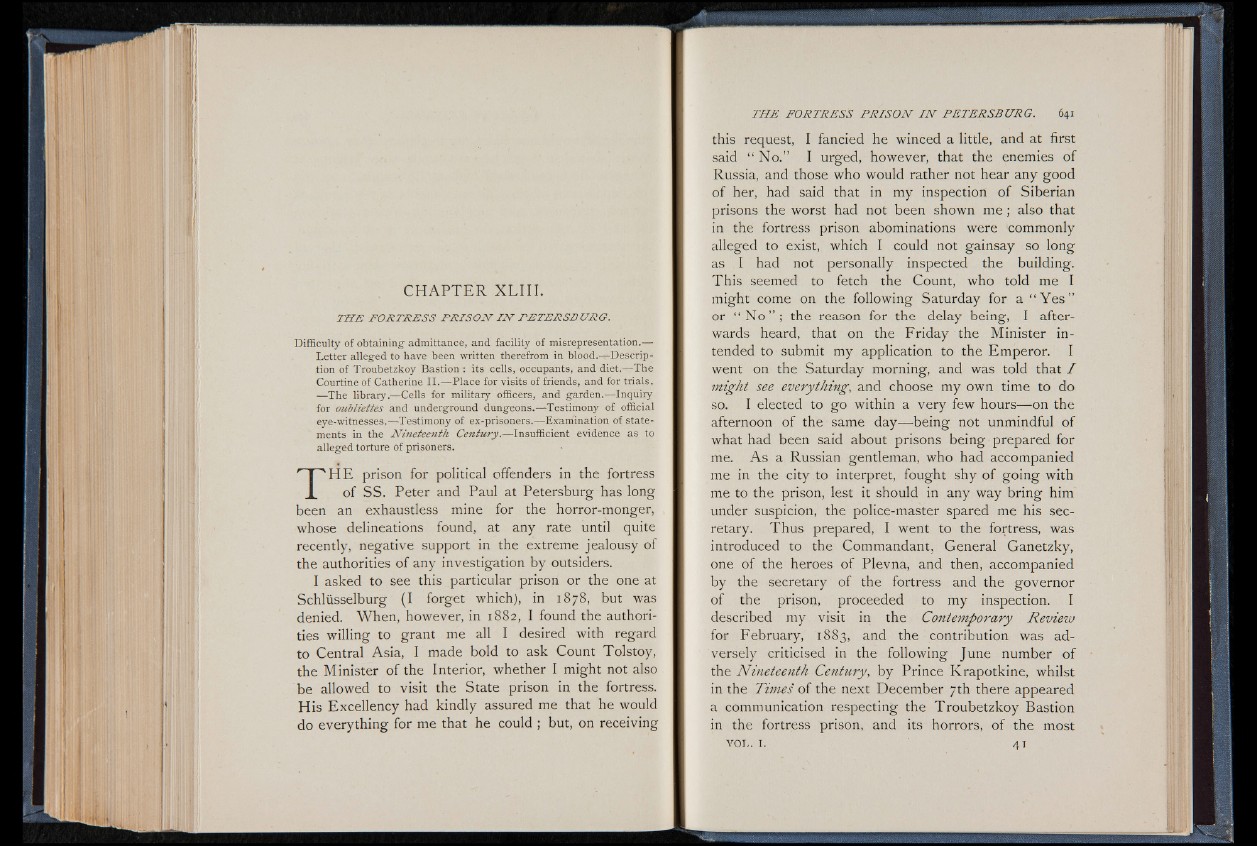
C H A P T E R X L I I I .
T H E F O R T R E S S P R I S O N I N P E T E R S B U R G .
Difficulty of obtaining admittance, and facility of misrepresentation.—
Letter alleged to have been written therefrom in blood.— Description
of Troubetzkoy Bastion : its cells, occupants, and diet.— The
Courtine of Catherine I I .— Place for visits of friends, and for trials.
— The library.— Cells for military officers, and garden.— Inquiry
for o u b lie tte s and underground dungeons.— Testimony of official
eye-witnesses,— Testimony of ex-prisoners.— Examination of statements
in the N in e te e n th C e n tu r y .— Insufficient evidence as to
alleged torture of prisoners.
TH E prison for political offenders in the fortress
of SS. Peter and Paul at Petersburg has long
been an exhaustless mine for the horror-monger,
whose delineations found, at any rate until quite
recently, negative support in the extreme jealousy of
the authorities of any investigation by outsiders.
I asked to see this particular prison or the one at
Schlusselburg (I forget which), in 1878, but was
denied. When, however, in 1882, I found the authorities
willing to grant me all I desired with regard
to Central Asia, I made bold to ask Count Tolstoy,
the Minister of the Interior, whether I might not also
be allowed to visit the State prison in the fortress.
His Excellency had kindly assured me that he would
do everything for me that he could ; but, on receiving
this request, I fancied he winced a little, and at first
said “ No.” I urged, however, that the enemies of
Russia, and those who would rather not hear any good
of her, had said that in my inspection of Siberian
prisons the worst had not been shown me ; also that
in the fortress prison abominations were commonly
alleged to exist, which I could not gainsay so long
as I had not personally inspected the building.
This seemed to fetch the Count, who told me I
might come on the following Saturday for a “ Y e s ”
or “ N o ” ; the reason for the delay being, I afterwards
heard, that on the Friday the Minister intended
to submit my application to the Emperor. I
went on the Saturday morning, and was told that I
might see everything, and choose my own time to do
so. I elected to go within a very few hours— on the
afternoon of the same day— being not unmindful of
what had been said about prisons being prepared for
me. As a Russian gentleman, who had accompanied
me in the city to interpret, fought shy of going with
me to the prison, lest it should in any way bring him
under suspicion, the police-master spared me his secretary.
Thus prepared, I went to the fortress, was
introduced to the Commandant, General Ganetzky,
one of the heroes of Plevna, and then, accompanied
by the secretary of the fortress and the governor
of the prison, proceeded to my inspection. I
described my visit in the Contemporary Review
for February, 1883, and the contribution was adversely
criticised in the following June number of
the Nineteenth Century, by Prince Krapotkine, whilst
in the Times of the next December 7th there appeared
a communication respecting the Troubetzkoy Bastion
in the fortress prison, and its horrors, of the most
vol.. 1. 41